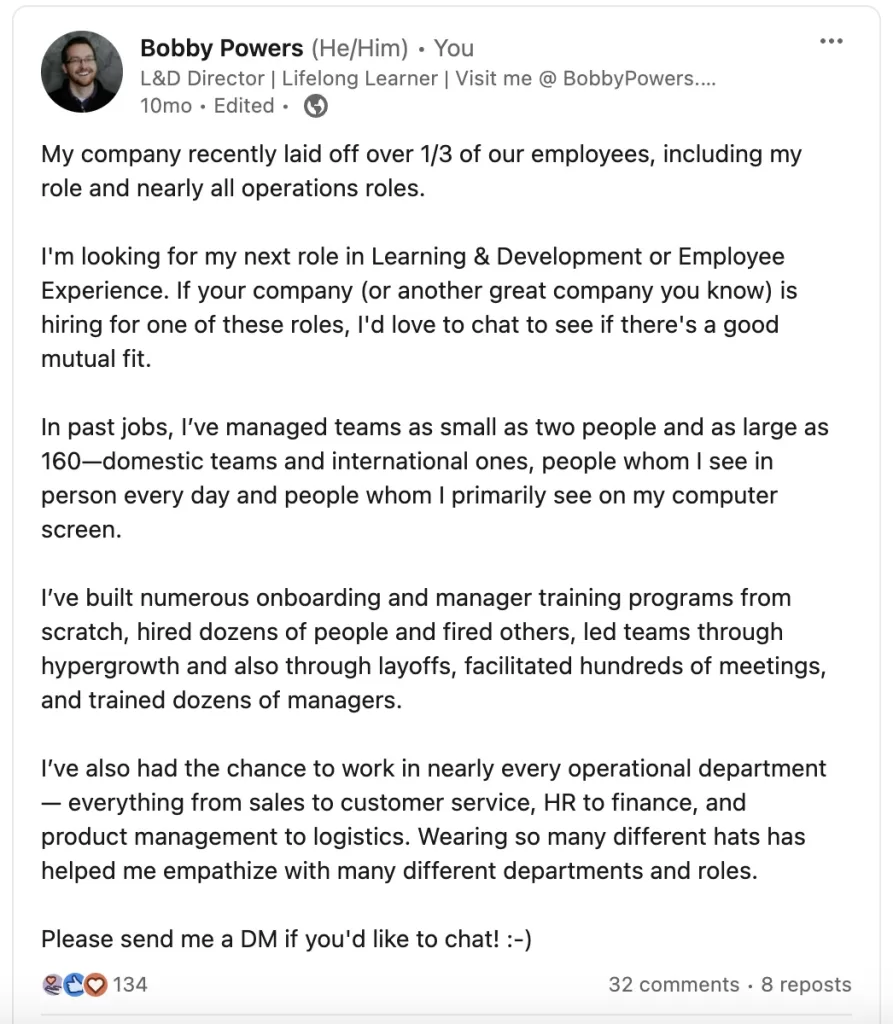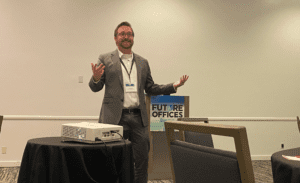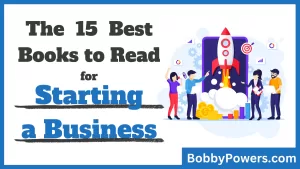Laid Off? Try These 5 Tips to Get Back on Your Feet
I work in HR, so I sometimes have to do company dirty work. For example, last February, I had to oversee a company layoff.
In a single day, my firm laid off a quarter of our workforce, and my boss and I had to manage all of the behind-the-scenes logistics: when to tell people, how to tell people, when to shut off their computer access, etc.
It was terrible.
Then, one month later, I was laid off. The timing was wild, especially because I had just been on the other side of the table one moon prior.
I understood why it happened because the company was struggling and needed to cut costs. But all of a sudden, I was out of a job, along with a third of the remaining employees — essentially the company’s entire operations team across multiple departments.
The experience was tough, but it was a good learning process. It solidified the Stoic perspective I’ve been honing for years: there are many things I can’t control, so I should only focus on what I can control. It taught me that even if you’re a high performer receiving raises and strong reviews, you could lose your job at any moment.
I also learned that it’s possible to bounce back — and do it quickly. After taking some time off, I hit the job search and surprisingly landed a position within two weeks of beginning my search.
Here are five things I learned about how to maintain sanity amidst a layoff and land on your feet:
1. Create a daily schedule so you don’t go insane
Our bodies and brains crave routines, and those routines get tossed out the window the minute you’re laid off. If you’re not careful, you’ll spend your days chomping down Doritos while binging Breaking Bad re-runs (actually, that doesn’t sound so bad!).
It’s important to give yourself a daily schedule to follow to feel like a contributing member of society rather than a housebound couch potato.
For example, here’s the rough schedule I created during my job search:
- 8 am: Wake up
- 8–8:30 am: Exercise
- 8:30–9 am: Shower and get ready for the day
- 9 am-12 pm: Job search, coffee dates, job applications
- 12–1 pm: Eat lunch, downtime
- 1–3 pm: Read and learn (MasterClasses, TED talks, etc.)
- 3–5 pm: Job search, coffee dates, job applications
- 5 pm: “Sign off” for the day, eat dinner, hang out with my wife
A schedule like this can be remarkably helpful. It grounds you and enables you to be productive while also allocating time to relax guilt-free.
2. Prioritize personal connections over aimless applications
Some experts estimate that 70–80 percent of jobs aren’t even posted publically; they’re instead filled with trusted connections like friends and acquaintances. I’m guessing that estimate is high, but the point remains: hiring managers prefer to hire people they know.
I’ve witnessed this firsthand, having worked at multiple companies jam-packed with employees who began as personal connections of the executive team, managers, or HR staff.
My friend Mike and I recently tallied how many of our past jobs came from personal connections versus random job applications. Five of my six jobs came from personal connections, and Mike’s number was just as high.
Five out of six. That statistic is INSANE, and if you ask around, you’ll hear many others express similar numbers. I’ve heard the phrase “It’s not what you know, it’s who you know” so many times I could barf, but I’m just now beginning to realize how true it is.
I recently talked to someone who submitted applications to over 200 companies during their recent job search. Don’t be that person. Avoid the “spray and pray” approach. Instead, go where the numbers are: work through your network to find the right opportunity.
3. Set up as many coffee dates as possible
Because most jobs come through your network, I’ve realized that if I had to choose between submitting an application somewhere and taking a friend to coffee to chat about their company, the latter probably has better odds of eventually converting into a job.
So during my unemployment, I decided that the best possible investment I could make was to buy a $5 coffee for any friend or acquaintance who either: (A) worked somewhere I wanted to learn more about or (B) was connected to someone I wanted to meet.
Every coffee date (in-person or virtual) you schedule is a seed planted in rich soil. It’s impossible to know which one will sprout, but the more seeds you plant, the more people you’ve enlisted to try to find your next gig.
4. Take a “trust fall” on your friends' network
Coffee dates are great, but you also want your entire network to learn that you’re now on the market for your next role. The best way to do that is by posting on LinkedIn about your job search.
The best LinkedIn posts are those that honestly explain what happened (“I got laid off…”) while describing what you’re looking for (“I’m looking for a Product Manager role in a fast-moving tech company”) and reaffirming the skills you can offer your next employer (“I have experiencing leading X, Y, and Z”).
Here’s what my post looked like after I was laid off:

This post yielded numerous DMs and comments including the following:
- “Bobby, ping me. We don’t have an open req but I think we could find something.”
- “Hey man, sorry to hear about the layoff. What sort of salary range are you looking for?”
- “Check out openings at [my company] and let me know if I can make an introduction. Good luck!”
- “Will send over anything I find Bobby! 🤗”
One of these comments sparked a conversation that turned into my next job. You never know what impact a social network “trust fall” will have, but they sometimes turn out to be quite fruitful.
5. Take advantage: do the fun things you normally can’t do
Lastly, it’d be easy to mope about losing your job, but don't forget about the silver linings of your newfound unemployment.
Take advantage of the little perks you wouldn’t normally be able to do if you were working: Stay up late watching a movie. Sleep in a bit later. Go on a midday run. Do your grocery shopping while everyone else is working.
These small perks can help you find some “funemployment” during this difficult time.
In addition to everything mentioned above, keep your chin up. Things will work out in the end. And don’t forget: your friends and LinkedIn network will do everything they can to help you land your next gig, as long as you reach out to them and ask them for help.





thanks for info.